
Related
Guests
- Kerry Kennedyone of Robert Kennedy’s children. She is a longtime human rights advocate and the founder of the Robert F. Kennedy Memorial. She is also the founder of Speak Truth to Power, a division of the Memorial which is committed to human rights awareness.
On Wednesday, the Kennedy family celebrated the renaming of the Triborough Bridge for Robert F. Kennedy. Attendees included Archbishop Desmond Tutu, Harry Belafonte, New York Governor David Paterson and former President Bill Clinton. [includes rush transcript]
Transcript
AMY GOODMAN: The Archbishop Desmond Tutu joined several generations of the Kennedy family Wednesday celebrating the renaming of the Triborough Bridge for Robert F. Kennedy. Among those who attended were actor and activist Harry Belafonte, the New York governor David Paterson, former President Bill Clinton and Senator Hillary Clinton.
Robert F. Kennedy, who would have turned eighty-three years old this week, was assassinated forty years ago on June 5, 1968, while campaigning for the Democratic presidential nomination. He had just won the California Democratic primary, a major boost to his campaign. Just after midnight, Kennedy addressed supporters at the Ambassador Hotel in what would be the last moments of his life.
ROBERT F. KENNEDY: What I think is quite clear is that we can work together in the last analysis and that what has been going on within the United States over the period of the last three years, the divisions, the violence, the disenchantment with our society, the divisions, whether it’s between blacks and whites, between the poor and the more affluent, or between age groups or on the war in Vietnam, that we can start to work together. We are a great country, an unselfish country and a compassionate country. And I intend to make that my basis for running over the period of the next few months.
Mayor Yorty has just sent me a message that we’ve been here too long already. So, my thanks to all of you, and now it’s on to Chicago, and let’s win there.
AMY GOODMAN: Robert Kennedy never made it to Chicago. Moments after that address, he was assassinated. He was forty-two years old. A funeral was held at St. Patrick’s Cathedral in New York. His younger brother, Senator Ted Kennedy, delivered the eulogy.
SEN. TED KENNEDY: My brother need not be idealized or enlarged in death beyond what he was in life to be remembered simply as a good and decent man, who saw wrong and tried to right it, saw suffering and tried to heal it, saw war and tried to stop it. As he said many times in many parts of this nation to those he touched and who sought to touch him, “Some men see things as they are and say why. I dream things that never were and say why not.”
AMY GOODMAN: Robert Kennedy’s death came just two months after Dr. Martin Luther King’s assassination in Memphis. Kennedy had broken the news of King’s assassination to his supporters while campaigning in Indianapolis. He delivered what was to become a famous speech.
ROBERT F. KENNEDY: For those of you who are black and are tempted to be filled with hatred and distrust, of the injustice of such an act, against all white people, I would only say that I can also feel in my own heart the same kind of feeling. I had a member of my family killed, but he was killed by a white man.
My favorite poet was Aeschylus. And he once wrote, “Even in our sleep, pain, which cannot forget, falls drop by drop upon the heart, until in our own despair, against our will, comes wisdom through the awful grace of God.”
What we need in the United States is not violence and lawlessness, but is love and wisdom and compassion toward one another, a feeling of justice toward those who still suffer within our country, whether they be white or whether they be black.
AMY GOODMAN: That was Robert Kennedy breaking the news to his own supporters in Indianapolis. He had heard on the plane that Dr. King was assassinated.
Well, on Wednesday this week, at the dedication ceremony of the RFK Bridge here in New York, Governor Paterson reminded the audience that in 1968 Kennedy had predicted it would take forty years for a black president to be elected.
Kerry Kennedy is one of Robert Kennedy’s children. She is a longtime human rights advocate, founder of the RFK Memorial Center for Human Rights, also founder of Speak Truth to Power, a division of the Memorial which is committed to human rights awareness. Kerry Kennedy joins us here in our firehouse studio. Welcome to Democracy Now!
KERRY KENNEDY: It’s great to be back, Amy.
AMY GOODMAN: Well, this is a big week for your family.
KERRY KENNEDY: It’s true. You know, it meant so much to all of us to have the bridge named for my father, because he spent so much of his life bridging divides between black and white, rich and poor, young and old. And this is a bridge that links Manhattan and Harlem to Queens and the South Bronx, but also upstate and downstate, because it’s where Route 87, the New York State Thruway, comes into the city.
AMY GOODMAN: In other words, it’s a bridge to somewhere.
KERRY KENNEDY: Exactly, exactly. And it’s really symbolic of everything he tried to do with his life.
AMY GOODMAN: Talk about the RFK Memorial that you founded.
KERRY KENNEDY: Well, the RFK Center for Justice and Human Rights works with people who are human rights heroes around the world, people who are on the cutting edge of social change in their countries. And we develop programs with them to enhance their capacity on the ground in their countries and also to make them more effective in lobbying Congress, for example, or at the UN, World Bank or other international fora.
In the last year, to give you a sense of some of the things we’ve done, we’ve worked with the tomato pickers, the Coalition of Immokalee Farmworkers in South Florida, who have emancipated over a thousand people from slavery. We’ve helped them get a wage increase for the first time in decades from Burger King.
AMY GOODMAN: Your father was very close to Cesar Chavez.
KERRY KENNEDY: He was very close to Cesar. So this is, in many ways, sort of carrying forward Cesar’s work, as well. In Darfur, we’re working with Dr. Mohammed Ahmed, who is one of the leaders there in putting together the peace process. And he was interested in post-conflict reconciliation issues. So we were able to help train him on those issues so that he can include those in the peace process there.
AMY GOODMAN: And right now, how does the Center continue? How does it get its support?
KERRY KENNEDY: Well, we get our support through foundations and through individual donations.
AMY GOODMAN: You were a big part this year of the election. You supported the candidate who didn’t win, Hillary Clinton.
KERRY KENNEDY: Hillary, and then Barack Obama.
AMY GOODMAN: And what were your thoughts on that? How did you transition from one to the other, as your father predicted forty years from now, in 1968, there would be a black president?
KERRY KENNEDY: Well, you know, I have so much — I’ve always had so much admiration for Barack Obama. I worked for Hillary, because I’ve known her and I’ve worked with her for so many years. And I think that one of the things that she talks about is that when she’s traveled around the world, she’s seen the importance of empowering women to creating real change. And I think if she becomes Secretary of State, it will be a great thing not only for our country, but for the entire world, for that reason.
But with Barack Obama, he has galvanized so much support in our country and around the world in such a very special way. This campaign brought out so many people, not only to vote, but to go door to door to work in it, to be part of our democracy. And I think that strengthened our nation and has captured the imagination of the entire world.
AMY GOODMAN: Your father was headed to Chicago, if he hadn’t been assassinated, to this now historic city, where we saw the night of the election Barack Obama in Grant Park. What was your feelings that night?
KERRY KENNEDY: Well, my feelings were that we have just come such a long way as a nation. And it was an extraordinary moment. I felt so proud. I felt so proud of us, all the people who worked so hard in this campaign, and also all those people who found it difficult to pull that lever for an African American and yet overcame their prejudice in order to do it because of the substance of his positions on policy. So I think that that is wonderful for our country.
AMY GOODMAN: Kerry Kennedy, you’re holding a most unusual auction. And we only have a minute to go. But I was just learning about it before the show.
KERRY KENNEDY: Well, yes. You just go to www.rfkcenter.org. You can bid on a thirty-minute voice lesson with Aretha Franklin.
AMY GOODMAN: With Aretha Franklin?
KERRY KENNEDY: Yes. And then you can go and have a — you can bid on a thirty-minute audition with Clive Davis, who is the powerhouse behind American Idol. You can bid on a guitar signed by Santana, a guitar signed by The Who. It’s a lot of fun, so go and take a look. You’ll find something you want.
AMY GOODMAN: And your plans for the future of the Center?
KERRY KENNEDY: Well, you know, we’re working right now — we just gave our RFK Human Rights Award to Aminatou Haidar, who is the leader of human rights in western Sahara, which is sort of a forgotten part of the world. So we’re going to be working very closely with her in the future.
AMY GOODMAN: Kerry Kennedy, I want to thank you for joining us. Again, her father’s name is now on the Triborough Bridge here in New York. Kerry Kennedy has also written a new book about Being Catholic Now: Prominent Americans Talking About Change in the Church and the Quest for Meaning.

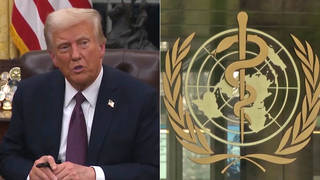
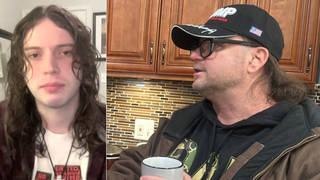
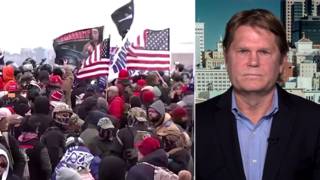
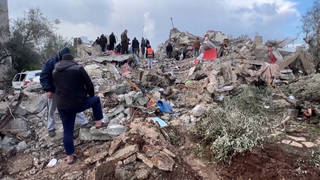





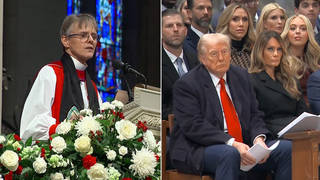
Media Options